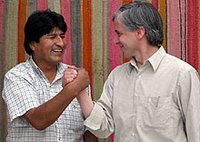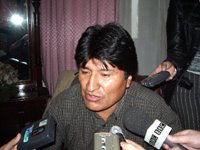Bolivia's Vice-President Alvaro Garcia Linera went to Washington with quite a big mission, to improve relations with the United States. Just a week before President Evo Morales, as Guillermo Martinez in Diario De Las America's, pointed out, appealed to the European Union asking for help in negotiations and dialogue with the United State. Garcia Linera, reputedly close to Morales and with the credibility of an ex-guerilla leader and top MAS strategist, was understood in D.C. to come with the authority of Bolivia's top leadership to get things done.

Joined by some opposition members, government officials, and business leaders, and with an increasing reputation as a pragmatist he tried to get his message across, writing in the Miami Herald, Pablo Bachelet summarized the message:
García Linera brought a soothing message to Washington: that the Bolivian government is fully committed to democratic principals and to fighting drug trafficking, and that foreign investors had little to fear, despite a recent nationalization of the Andean country's oil and gas.
The timing seemed right. As stated before , the Bush Administration has much bigger fish to fry, and Bolivia is at the very end of its priorities. A landlocked and impoverished South American country poses little threat in comparison to the usual suspects in the Middle East getting headlines these days. Basically, the government of Bolivia could get one of the best shots in Washington it has had in decades, and if it presented its case adequately might sway some skeptics.
We Are Not Chavez!
This all has to viewed in the context of Evo's relationship with Venezuelan President Hugo Chavez anti-US rhetoric, and polarizing role in South America. Garcia Linera tried to deliver a message that Evo was not a "Chavez clone", and is pretty much his own man. Evo's anti-American rhetoric could be spun away as a public posture, his more pragmatic side was on display in Washington D.C. Whether this attempt was helped or not by the simultaneous spectacle of Chavez cavorting with Castro in Argentina, and then going on a weapon-buying spree to Russia is debatable. But at least the idea could be transmitted from the guerilla-turned-statesman that the Bolivian government was pragmatic and possibly could be weaned away from the Venezuelan leaders side.

We Like Capitalism!
Garcia Linera delivered the standard line that the recent decrees on nationalization of oil and gas, was not nationalization, but in fact mostly a re-negotiation of established contracts. He further stated that the Morales administration was "not interested in a majority presence of the state in other areas of the economy." Meaning the economy will for the most part be a market economy, and hinting at future measures like judicial protection for foreign investment. At a time of rising oil prices, re-negotiation of production contracts does not sound too unreasonable, particularly when the aggrieved parties are mostly companies from Brazil and Europe.
Ok, What Do You Really Want?
The prime motive of García Linera's trip was to lay the groundwork to extend the Andean Trade Promotion and Drug Eradication Act that expires in December. The act gives Bolivia preferential access to the U.S. market and aims to promote a non-drug-trafficking economy
The Act allows Bolivia's soy exports and textiles, to enter the U.S. duty free, as well as contributing 10's of millions of dollars for fighting drug trafficking. It is estimated that Bolivia gains something like 300 million dollars a year and provides 50,000 to 100,000 jobs. According to Bachelet the Bolivian government's aim was to "extend the trade pact for at least another year as the constituent assembly finishes its work." Current U.S. policy is to replace these provisions with free trade pacts. Garcia Linera could argue with somewhat of a straight face that with the project of re-writing the Constitution expected to last a year, entering into a major a free trade treaty without a firm constitutional regime in place was impossible. Reality is that Evo Morales has pretty much sworn not to enter into a free trade pact with the U.S. Is it possible that Garcia Linera hinted at a subsequent rethinking down the road? A year is a long time after all, politicians do change their stripes as Garcia Lineras own example shows.
EVO THE MOUTH STRIKES AGAIN!

But no sooner did Garcia Linera leave D.C., that a storm broke out. Morales speaking at the 19th anniversary of Bolivia's Special Drug Fighting Forces, blasted American drug policies as "blackmail". Specifically he was speaking of the U.S. governments policy of certifying countries that fight against narcotics trafficking and to recent international press accounts that faulted Bolivia's efforts in that regard. Martinez describes the reaction Evo's comments had among the Washington policymakers that Vice President Garcia Linera had spoken to:
If in any moment congressional leaders or Bush administration officials thought that it was possible to improve relations with Bolivia, these expectations were dashed rudeluy by Morales words. Instead of improving the relations between La Paz and Washington, Garcia Linera's trip left a sour taste among the people with whom I speak to in Wahsington. It is hard to improve relations with a government that sends an envoy to build bridges, to immediately blow them up by statements of its own president.
ITS ABOUT THE COCA STUPID!
That is the bottom line, the aid package depends on erradication of Coca. Evo's statements were about coca erradication. The worst moments in U.S.-Bolivian relations since 1978 have all been about Bolivia's role as a supplier of the coca leaf and at one point producer and exporter of cocaine. Early U.S. opposition to Evo Morales is not based on his being a leftist, rather it was as a leader of the coca growers federation.
García Linera did put a good face on current Bolivian anti-coca efforts. Published accounts in the Herald and the Washington Times quote him a saying that the government plans to erradicate coca were going ahead, with 62 acres erradicated daily, a reduction of about 15 percent in the next months. But as both stories point out, part of Bolivia's anti-drug policies are paralyzed through government inaction, and there are serious indications that there is an increase in cocaine production.
Ultimately the issues are complicated, but not insurmountable. They require regulating the coca market, planning and enacting a realistic erradication policy. They require a concerted effort and committment by Evo Morales and MAS. Merely railing at the U.S. gets you nowhere, particularly when more than 50,000 jobs might be on the line. At the very least the government could have opened a dialogue, that like everything else ends up in negotiation. But Morales seems to have wrecked even that beginning.
1 comment:
Fuck it. Tell the empire to fuck off and let the thugs invade.
I am convinced that the Yankee stupidity necessitates a massive die-off of the fat, indoctrinated, fascist clones who would put their stupid asses on the one for the empire.
Vietnam took out 50,000 of these anglo-warriors. Regrettably, the criminal empire killed two million innocent civilians in that failed effort.
How many stooges for empire have to die before they get it through their stupid brains that it ain't cool to invade and bomb other countries?
just asking.
By the way, Boli-nica--do you support the Iraq war? If so, why aren't you over there fighting?
Just asking.
Post a Comment